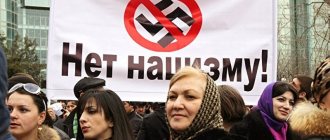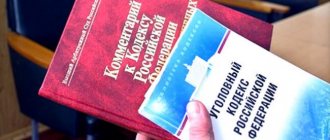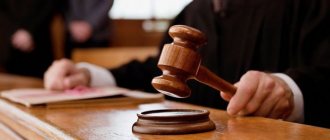Unfortunately, during criminal proceedings, mistakes are often made, due to which a subject not involved in the crime may suffer; Such mistakes can be made by interrogators, investigators, and courts. If this happens, persons brought to criminal liability by mistake, by virtue of Article 53 of the Constitution of the Russian Federation, have the right to count on compensation for damage caused by illegal actions (inaction) of government bodies or officials, that is, rehabilitation.
The main provisions regarding criminal rehabilitation are set out in Chapter 18 of the Code of Criminal Procedure of the Russian Federation. Thus, according to Article 133 of the Code of Criminal Procedure of the Russian Federation, the right to rehabilitation in criminal proceedings is granted to individuals in respect of whom:
- an acquittal was announced (excluding criminal cases of private prosecution);
- the prosecution ended due to the state prosecutor's refusal to charge;
- the prosecution ended due to the absence of an event or corpus delicti, the absence of a statement by the victim in criminal cases of private and private-public accusations, as well as in some other cases established by law;
- the conviction that entered into legal force was cancelled, including partially, and the criminal case was terminated due to the non-involvement of the convicted person in committing a crime or on other grounds established by law;
- when canceling an illegal or unfounded court order to apply compulsory medical measures.
Also, other individuals have the right to rehabilitation in respect of whom procedural coercive measures were illegally practiced (for example, there were illegal detentions, arrests, detention, etc.). Quite often, assistance in economic crimes is required for subjects acting, for example, as witnesses.
“Individuals who have escaped punishment due to an amnesty, expiration of the statute of limitations, not reaching the age of criminal responsibility, the inability to understand the nature of the crime and control their actions due to mental retardation, the adoption of a law that eliminates crime or the punishability of the act cannot count on rehabilitation.”
Rehabilitation in criminal proceedings: what does it include
A citizen who has become a victim of an error by the preliminary investigation or justice authorities has the right to count on:
- Compensation for property damage. The subject can recover from the state, for example, lost income, expenses for the services of a defense lawyer, court fines, the cost of destroyed property, etc. Therefore, in each case the amount may be different.
- Compensation for moral damage. When determining the amount of compensation, you should take into account the duration of the process, the type of sanction, as well as other important points. In addition to money, an employee of the prosecutor's office must apologize to the citizen on behalf of Russia. If information about the criminal case was covered in the media, then the same publication should contain a note about rehabilitation.
- Restoration of labor, property, pension and other powers. For example, someone illegally brought to criminal liability is subject to reinstatement in his previous position at his previous place of work, previously confiscated property is returned to him, his rank is restored, etc.
“A number of controversial issues regarding the use of rehabilitation in criminal proceedings are resolved by the courts in accordance with Resolution of the Plenum of the Supreme Court of the Russian Federation dated November 29, 2011 No. 17 “On the practice of application by courts of the norms of Chapter 18 of the Code of Criminal Procedure of the Russian Federation governing rehabilitation in criminal proceedings”
If a citizen wants to recover property damage, he should apply with the corresponding demand to the court that decided to terminate the criminal case (prosecution), or to the court at his own place of residence, or the location of the body that decided to terminate the criminal case or prosecution, which made the decision to illegal application of procedural coercive measures. This is allotted 3 years, which begin to be calculated from the moment the person learned about the violation of his rights. No later than 30 days, the judge decides on the issue of making payments.
The Constitutional Court prohibited reducing compensation during rehabilitation
On September 27, the Constitutional Court published a ruling on the complaint of Alexey Atroshchenko, who received compensation for unfounded criminal prosecution, but was then ordered to return part of the money. The applicant asked to check the constitutionality of the provisions of the Criminal Procedure Code, which allowed his situation to worsen after the court decision entered into legal force. The Constitutional Court explained that it is impossible to recover the compensation received from the rehabilitated person for an indefinite period.
Background
In 2014, a case was opened against Atroshchenko for possession of deliberately forged documents (Part 3 of Article 327 of the Criminal Code). Subsequently, first the prosecutor twice returned this case to the investigator, and then the magistrate twice more sent it to the prosecutor's office to eliminate the violations. As a result, in 2016, the proceedings were stopped due to the lack of evidence of a crime, and Atroshchenko’s right to rehabilitation was recognized.
- The Constitutional Court considered the issue of compensation for moral damage from fraud
September 21, 13:52 - The Constitutional Court obliges arbitration courts to index debts
July 23, 16:47
In 2022, the Nakhodka City Court of the Primorsky Territory decided to pay him 1.2 million rubles. as a compensation. At the same time, throughout this year the prosecutor unsuccessfully tried to resume the criminal prosecution of Atroshchenko. As a result, already in October 2022, the court again decided to recover 1.2 million rubles in favor of the rehabilitated person. expenses for legal assistance, as well as compensation for the costs of considering rehabilitation issues. The appeal and cassation confirmed this decision. Atroshchenko received the amount due to him from the Federal Treasury Department for the region.
In August 2022, the Supreme Court decided to transfer the cassation appeal of this body to the Primorsky Regional Court. After this, the case for collecting compensation was sent for a new appeal, and in February 2020, the amount of compensation was reduced by 900,027 rubles. The Primorsky Regional Court ordered Atroshchenko to return this amount. At the same time, the courts found that, at the expense of the previously collected amount, he was repaying the loans that he had previously taken out to pay for legal assistance. Since Atroshchenko could not return the requested funds at once, he was provided with an installment plan to fulfill this requirement. That is, the courts did not question whether the amount of compensation he received corresponded to the actual costs he incurred. However, the courts found the amount of compensation to be excessive.
Atroshchenko asked to check clause 4, part 1, art. 145 Code of Criminal Procedure, Art. 401.6 Code of Criminal Procedure and clause 1, part 2, art. 401.10 of the Code of Criminal Procedure for compliance with the norms of the Basic Law. In his opinion, taken together, these norms make it possible to worsen the situation of the rehabilitated person after the court decision to award compensation to the victim enters into legal force.
Position of the Constitutional Court
The state not only must suppress illegal investigative or operational search activities and similar violations, but is also obliged to compensate for the damage associated with them, the Constitutional Court emphasized. Victims should have legal guarantees of compensation for such harm, and they should not be burdened with proving the fact of such harm as a weakness in the process.
At the same time, the rules governing the procedure for such compensation oblige the court to include in the scope of compensation for property damage all amounts actually paid by it for the provision of legal assistance, the Constitutional Court indicates. There are no special rules in the Code of Criminal Procedure that would allow courts, at their discretion, to unreasonably reduce the amount of such compensation. The high cost of such services in itself does not justify the derogation of the rights of a rehabilitated citizen. Moreover, if the information provided by the citizen is not enough to confirm the amount of real costs, the court itself must assist him in obtaining the missing evidence.
All expenses that are “in a causal relationship with the provision of legal assistance to him” are subject to compensation. This directly follows from the norms of the Constitution, the Constitutional Court emphasizes. At the same time, if the lawyer imposed on the client services that are actually unrelated to the legal position in a particular case, the state is not obliged to compensate for the costs of them. In addition, the Constitutional Court previously indicated that the amount of compensation may be reduced if the cost of legal services allegedly paid by the person being rehabilitated significantly exceeds the market value of such services at the time of the process. But the state cannot expect that a citizen will receive legal services at the lowest possible price.
The state has no right to expect that a citizen will receive legal services at the lowest possible price.
Criminal prosecution in particular gives the suspect or accused a reason to seek high-quality legal assistance and makes it difficult to be prudent in such expenditures. Often, lawyers are forced to prepare different lines of defense without knowing what the prosecution will do, so some of the defense's actions may have no practical procedural consequences. Under such circumstances, the refusal to recognize the rehabilitated person’s expenses for legal assistance cannot be considered fair.
Abuse of rights on the part of the rehabilitated person or his lawyer must be determined by the court. It cannot be presumed and compensation cannot be reduced on this basis, the Constitutional Court emphasizes.
- The Constitutional Court has simplified the collection of legal costs from government agencies
July 19, 17:24 - The Supreme Court allowed the recovery of court costs for a full-time lawyer
July 6, 15:43
In addition, participants in the process must be able to reasonably foresee the consequences of their behavior and be confident in the invariability of the status approved by the court. As the Constitutional Court has repeatedly pointed out, no one can be put at risk of possible encumbrance for an indefinite or too long period.
In addition, for a rehabilitated person, repeated returns to the events of criminal prosecution can be psychologically traumatic, and the state should avoid creating such situations. This is aggravated if cassation worsens the situation of the rehabilitated person and imposes new financial obligations on him.
According to the Constitutional Court, Art. 401.6 of the Code of Criminal Procedure, which deals with cassation review, should be applied to decisions of guilt and innocence, as well as related sanctions. In the matter of collecting compensation and its amount, this article should not apply. But in the current legal system there are no other rules that would limit the deterioration of a person’s situation in connection with criminal prosecution. This is a constitutionally significant gap in the legislation, the Constitutional Court points out. The legislator must provide for regulation and limitation of terms for the deterioration of the legal situation, which is not related to the determination of their status and guilt in criminal cases. Until then, courts should be guided by the clarifications of the Constitutional Court.
The Constitutional Court decided to review the judicial acts in the Atroshchenko case, which do not correspond to the interpretation of the norms of the Code of Criminal Procedure given in the resolution.
- Pravo.ru
- constitutional Court
When do rehabilitation rules not apply?
Rehabilitation cannot be applied to persons in respect of whom the charge has been dropped or the sentence has been overturned for the following reasons:
- Expiration of the statute of limitations.
- Adoption of the amnesty act.
- The citizen has not yet reached the age of criminal responsibility in this case.
- If a citizen who has committed a crime is lagging behind in mental development (but does not have mental illness) and therefore cannot be aware of the social danger of his actions and the nature of the unlawful act.
- Adoption of a legislative act that recognizes what has been done as a non-criminal offense or completely removes it from the list of criminal attacks.
Each criminal case requires a competent approach to determine whether there are grounds for the rehabilitation of the convicted person.
Compensation for property and moral damage
Having received a demand from a rehabilitated citizen or his relatives and dependents, if the citizen has died, the judge is obliged to determine the amount of compensation within a month and make a decision on its payment. These funds must be paid taking into account inflation.
A copy of the court decision must be given to the rehabilitated person or his relatives who have filed an application for compensation. The list of persons who have the right to make a claim in the event of the death of the rehabilitated person is indicated in paragraph 2 of Article 134 of the Code of Criminal Procedure of the Russian Federation.
Courts consider such applications in a simplified manner. The applicant is not required to submit evidence for the judge to determine the grounds and amount of compensation.
In some cases, the available evidence may not be sufficient to make a compensation order or determine its amount. In this case, the court must assist the applicant in searching and obtaining additional documents, including through requests to various authorities.
Based on the requirement to release the applicant from the need to prove his rights, Russian legislation concludes that in controversial situations, the court must act in favor of the applicant. Doubts when making a court decision on compensation in this case are also interpreted in favor of the applicant.
However, in actual judicial practice, the court’s doubts are not always interpreted in favor of the rehabilitated person. It is better for him to collect the necessary documents in advance so that his rights to rehabilitation and compensation are absolute and cannot be challenged.
Moral damages to the victim will be compensated in the following order:
- An official apology by the prosecutor. He will apologize on behalf of the state for the harm caused by the criminal prosecution.
- Filing a civil claim in court to recover compensation for moral damage.
Additionally, if information about the arrest of a rehabilitated person or other circumstances of the case brought against him was published in the media, then the court will issue a ruling on the publication of a message about rehabilitation. The media must publish it within 30 days of the court ruling.










